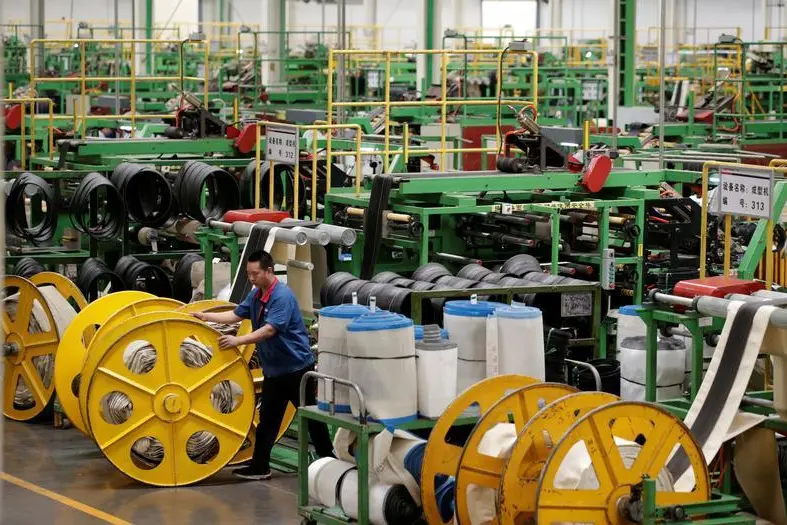PHOTO
BEIJING - China's factory activity expanded at a steady but modest pace in May, a private survey showed, but analysts say front-loading of exports by firms to the United States to avoid higher tariffs masked underlying weakness in the economy.
Manufacturers in the world's second-biggest economy have come under severe pressure recently from an escalating trade dispute with the United States. An official gauge on factory activity last week showed conditions deteriorating as both domestic and external demand slackened.
Monday's Caixin/Markit Manufacturing Purchasing Managers' Index (PMI) also showed only modest expansion at 50.2, unchanged from April, and above economists' expectations of 50.0.
While it marked the third-month the index has stayed above the neutral 50-mark dividing expansion from contraction, output growth slipped and businesses were the least optimistic on production since the survey series began in April 2012.
Growth of new orders picked up in May, although the rate of expansion remained marginal. Survey respondents attributed increased sales to stronger foreign demand and new product launches, with new export orders rising at its fastest pace since January after contracting in April.
But some also cited tough competition and more challenging trading conditions.
Unlike China's larger, official factory survey, the private gauge is mainly focused on small to mid-sized firms which are more export-oriented, exposing them to both disruptions from the months-long U.S.-China trade war and softening demand globally.
The increase in new export orders point to possible front-loading of U.S.-bound shipments by some firms to avoid potential tariff hikes that U.S. President Donald Trump had threatened to slap on another $300 billion of Chinese goods, analysts at Nomura wrote in a note.
However, the front-loading is likely to be "a short-lived distortion and more severe payback effects may follow," they said.
The Caixin survey showed factory output expanded at the slowest pace since January, and while some firms raised production due to higher new orders, others commented on relatively subdued demand conditions.
A considerable part of China's economic support programme has been aimed at keeping struggling smaller firms afloat, with Beijing particularly sensitive to any large-scale layoffs that could stoke social angst.
The survey showed companies continued to shed jobs in May for the second straight month to curb operating costs, following the first increase in hiring in nearly 5-1/2 years in March.
Most economists say Beijing will need to roll out more stimulus to support growth, with expectations centring on further cuts in the amount of cash banks hold as reserves and fiscal spending.
Last month's sudden escalation of China's trade dispute with the United States has further heightened fears of a steeper downturn for the world's second-largest economy. With Washington slapping additional tariffs of up to 25% on $200 billion of Chinese goods, prompting Beijing to retaliate, financial markets have had a torrid time in the past month.
Over a one-year horizon, businesses were the least optimistic on production since the survey series began in April 2012 in May.
"The ongoing China-US trade dispute, restrictive state policies, a weak automotive market and generally subdued global demand conditions were all cited as key factors likely to weigh on production over the next year," a statement accompanying the Caixin survey said.
In a note to clients, Jingyang Chen, an economist with HSBC Global Research, said the trade war remains a key risk for manufacturers.
"Beijing will likely double down on easing for the private sector."
(Reporting by Yawen Chen and Ryan Woo Editing by Shri Navaratnam;) ((yawen.chen@thomsonreuters.com; +86 10 6627 1207; Reuters Messaging: yawen.chen.thomsonreuters.com@reuters.net))





















